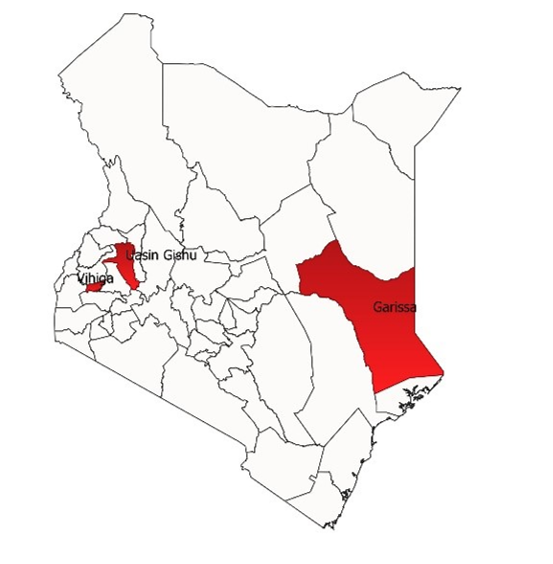
LSTM has received a grant from the Global Fund (Takeda Pharmaceuticals) in support of Quality improvement of integrated HIV, TB and Malaria Services in ANC and PNC, 2021-2023. Kenya is one of the three beneficiary countries. The other two countries are Tanzania and Nigeria. In line with the Global Fund Strategy 2017-2022 to invest in building sustainable and resilient systems for health (or “RSSH”), the proposed project will implement, document, and disseminate innovative approaches to improving the screening, testing and treatment of HIV, TB and malaria and improve integrated service delivery at facility and community levels. The project will be implemented in the three counties of Vihiga, Uasin Gishu and Garissa leveraging other ongoing LSTM supported interventions.
Programme Objectives
1. Identify the ‘bottlenecks’ to providing Quality of Care (or “QoC”)
Conduct a specialized study of QoC in ANC and PNC clinics, in addition to the use of existing HFA’s and routinely collected data, in a sample of facilities in the identified target counties (if detailed quality of care data is needed);
If necessary, undertake a secondary analysis of data for a small sample of counties and/or sites where the HFA was implemented in a subset of countries. This would include utilizing the latest epidemiologic information, routine service data and the Health Facility Assessment (or “HFA”) data to help support decision-making at the facility around management and service models (i.e., differentiated care, patient-centred care, task shifting or other Human Resources practices, etc.).
Partner with the Ministry of Health at national and/or local levels and work directly with the sites identified to share data and design an action plan based on the findings;
Document information collected to refine the specific package of interventions and focus needed for each site or cluster of health facilities to improve the availability and quality of antenatal and postnatal care provided for mothers and new-borns, reflective of a differentiated facility specific approach.
2. Design and introduce a Quality Improvement process at health facility level
Strengthen the capacity of healthcare providers and managers working at participating health care facilities in the provision and assessment of ANC and PNC and on the use of a standards-based audit as a mechanism for improving care.
Develop national and locally agreed evidence-based standards for care that are defined and measurable.
Identify immediate gaps in terms of essential equipment and supplies at facility level that are essential for the provision of antenatal and postnatal care.
Document and disseminate the lessons learnt.
3. Evaluate effectiveness and efficiency
Generate the evidence to reproduce and scale-up intervention packages and solutions to increasing availability and improving quality of care for integrated HIV, TB and malaria services during antenatal and postnatal care.
Document differentiated approaches to improving the quality of care at ANC and PNC facilities using a health system strengthening approach.
Key deliverables include.
- Capacity Building in integrated quality improvement at ANC and PNC targeting Principal Master trainers, Master Trainers and Health care workers in the select counties,
- Healthcare Facility Improvement – This will entail procurement and distribution of basic ANC and PNC equipment to a total of 30healthcare facilitiesand implementation of Standards based audits for quality improvement.
- Evidence Generation – Conduct baseline health facility assessment and End line Survey in 61and economic assessment in 30 Healthcare facilities.

Starting in June 2021, LSTM Kenya embarked on project implementation. The project was launched by the National MoH in October 2021 and in the respective three target counties. Thereafter, the project inception activities were finalized and by end of December 2021 interventions planned for the first year of the project were on track. The key deliverables are scheduled for delivery starting in January 2022 and completion date is December 2023.
Partners
In Kenya, the GF project will be implemented by LSTM Kenya in partnership with the EmOC Team supported by the Regional Technical Adviser. This is a collaboration between LSTM, the Ministry of Health, Kenya and the 3 County Governments of Vihiga, Garissa and Uasin Gishu.